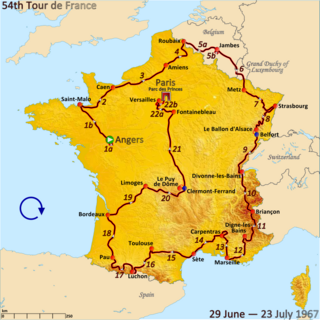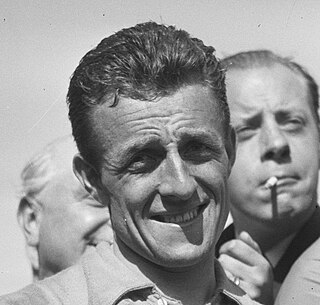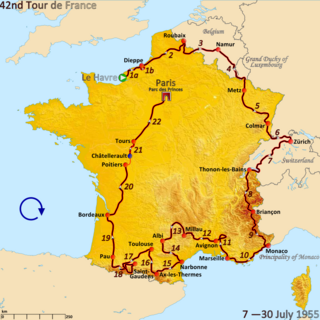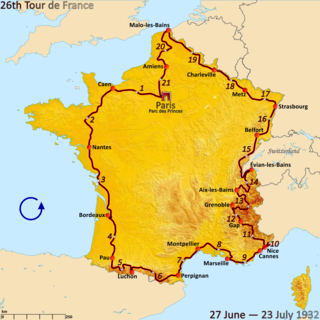The Challenge Yellow, also known as Challenge Sedis, was a prize given yearly by the chain company Sedis to the best cyclists in the French races from 1931 to 1982. The winner was unofficially seen as the best cyclist in the French cycling season.
As a reaction, the Super Prestige Pernod was founded in 1958. [1]

The mountains classification is a secondary competition in the Tour de France, that started in 1933. It is given to the rider that gains the most points for reaching mountain summits first. The leader of the classification is named the King of the Mountains, and since 1975 wears the polka dot jersey, a white jersey with red polka dots.

The 1995 Tour de France was the 82nd Tour de France, taking place from 1 to 23 July. It was Miguel Induráin's fifth and final victory in the Tour. On the fifteenth stage Italian rider Fabio Casartelli died after an accident on the Col de Portet d'Aspet.

The 1987 Tour de France was the 74th edition of the Tour de France, taking place from 1 to 26 July. It consisted of 25 stages over 4,231 km (2,629 mi). It was the closest three-way finish in the Tour until the 2007 Tour de France, among the closest overall races in Tour history and the 1st, 2nd, 3rd and 4th place riders each wore the Yellow jersey at some point during the race. It was won by Stephen Roche, the first and so far only Irishman to do so.

The 1907 Tour de France was the fifth running of the annual Tour de France, one of cycling's Grand Tours. From 8 July to 4 August, the 93 cyclists cycled 4488 km (2,788 mi) in fourteen stages around France. The winner, Lucien Petit-Breton, completed the race at an average speed of 28.47 km/h (17.69 mi/h). For the first time, climbs in the Western Alps were included in the Tour de France. The race was dominated at the start by Émile Georget, who won five of the first eight stages. In the ninth stage, he borrowed a bicycle from a befriended rider after his own broke. This was against the rules; initially he received only a small penalty and his main competitors left the race out of protest. Georget's penalty was then increased and Lucien Petit-Breton became the new leader. Petit-Breton won two of the remaining stages and the overall victory of the Tour.

The 1957 Tour de France was the 44th edition of the Tour de France, taking place from 27 June to 20 July. It was composed of 22 stages over 4,669 km (2,901 mi).

The 1982 Tour de France was the 69th edition of the Tour de France, taking place from 2 to 25 July. The total race distance was 22 stages over 3,507 km (2,179 mi). It was won by Bernard Hinault, his fourth victory so far.

The 1967 Tour de France was the 54th edition of the Tour de France, one of cycling's Grand Tours. It took place between 29 June and 23 July, with 22 stages covering a distance of 4,779 km (2,970 mi). Thirteen national teams of ten riders competed, with three French teams, two Belgian, two Italian, two Spanish, one each from Germany, United Kingdom and the Netherlands, and a Swiss/Luxembourgian team.

The 1908 Tour de France was the sixth running of the annual Tour de France, one of cycling's Grand Tours. It was organised by the newspaper L'Auto, and took place between 13 July and 9 August. The Tour was split in 14 stages, with a total distance of 4,497 kilometres (2,794 mi).

The 1909 Tour de France was the seventh edition of the Tour de France, taking place from 5 July to 1 August. It consisted of 14 stages over 4,497 kilometres (2,794 mi), ridden at an average 28.658 km/h. The results were computed by points accorded finishing positions on each stage, the rider with fewest points at the end of the race winning the race. The stages were approximately the same as in the 1907 and 1908 Tour de France.

Alfred De Bruyne was a Belgian champion road cyclist. He won six Tour de France stages early in his career and went on to win many other Monuments and stage races.

The 1955 Tour de France was the 42nd edition of the Tour de France, taking place from 7 to 30 July. It consisted of 22 stages over 4,495 km (2,793 mi). The race was won by Louison Bobet, the last of his three consecutive wins.

The 1935 Tour de France was the 29th edition of the Tour de France, taking place from 4 to 28 July. It consisted of 21 stages over 4,338 km (2,696 mi). Although the French team was favourite, Belgian Romain Maes took the lead in the first stage, and never gave it away. Halfway the race, Romain Maes' biggest threat, Antonin Magne, had to abandon after he was hit by a car.

The 1931 Tour de France was the 25th edition of the Tour de France, which took place from 30 June to 26 July. It consisted of 24 stages over 5,091 km (3,163 mi).

The 1932 Tour de France was the 26th edition of the Tour de France, taking place from 6 to 31 July. It consisted of 21 stages over 4,479 km (2,783 mi).

The 1933 Tour de France was the 27th edition of the Tour de France, taking place from 27 June to 23 July. It consisted of 23 stages over 4,395 km (2,731 mi).

The men's sprint was a track cycling event held as part of the Cycling at the 1964 Summer Olympics programme. It was held on 17 and 18 October 1964 at the Hachioji Velodrome. 39 cyclists from 22 nations competed. Nations were limited to two cyclists each. The event was won by Giovanni Pettenella of Italy, the nation's second consecutive and fourth overall victory in the men's sprint. Sergio Bianchetto took silver, making it the second consecutive Games in which Italy had two men on the podium in the event. It was also the fifth straight Games with Italy taking at least silver. Daniel Morelon of France took bronze, the first of his record four medals in the event.

The team classification is a prize given in the Tour de France to the best team in the race. It has been awarded since 1930, and the calculation has changed throughout the years. There is no colored jersey for this, but the numbers on the jerseys of the members of the team with the best performance in the general classification at the end of the previous stage are against a yellow background instead of white.
The men's sprint was a cycling event held at the 1968 Summer Olympics in Mexico City, Mexico, held on 18 to 19 October 1968. There were 47 participants from 28 nations. Each nation was limited to two cyclists. The event was won by Daniel Morelon of France, his second consecutive medal and first gold; it was also France's world-leading sixth victory in the men's sprint. His countryman Pierre Trentin, who had lost the bronze medal match to Morelon four years earlier, this year won it against Omar Pkhakadze of the Soviet Union. Between the French cyclists was silver medalist Giordano Turrini of Italy, extending that nation's streak of top-two results in the event to six Games.
The men's sprint cycling event at the 1988 Summer Olympics took place from 21 to 24 September and was one of the nine cycling events at the 1988 Olympics. There were 25 competitors from 25 nations. After the 1984 Games had featured a humongously bloated 34-cyclist, 11-round, 63-match competition, the competition size was cut down by restricting nations to one cyclist yet again and instituting a qualifying round: this reduced the format to 25 cyclists, 8 rounds, and 29 matches. The event was won by Lutz Heßlich of East Germany, the 1980 gold medalist who was unable to compete in 1984 due to the Soviet-led boycott. Soviet cyclist Nikolai Kovsh took silver, the best result to date for the Soviets. Gary Neiwand of Australia earned bronze; for both the Soviets and Australians, it was the first medal in the event since 1972.